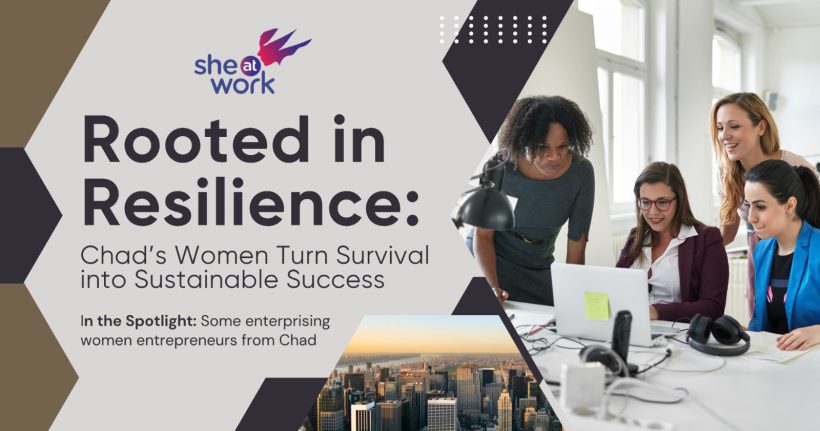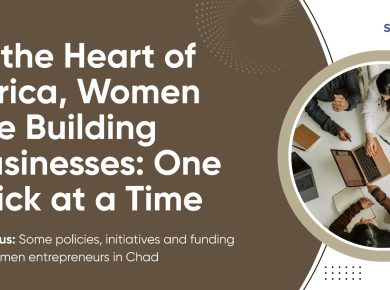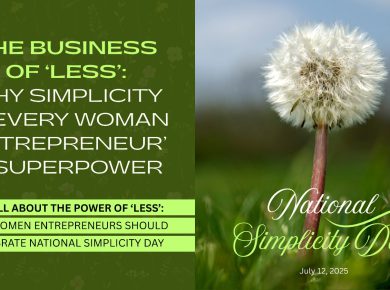In the Spotlight: Some enterprising women entrepreneurs from Chad
#ChadWomenRise #EntrepreneurshipAgainstOdds #SheLeadsChad #DesertDreamsToEnterprises #EmpowerChadianWomen #GrassrootsGrowth #WomenOfTheSahel #FromSurvivalToSuccess
Chad may be landlocked and largely desert, but when it comes to entrepreneurial spirit – especially among its women – it is anything but barren. Often referred to as the “Dead Heart of Africa”, Chad is brimming with untapped potential. And its women are courageously stepping into the spotlight – to claim their place in the nation’s economic evolution.
In a country where agriculture dominates 52% of the GDP and employs 80% of the population, most women-owned businesses still remain in the shadows of very small enterprises. These women juggle survival with ambition – running small farms, selling produce, weaving crafts, or managing roadside kiosks – not just to feed their families, but to fuel local economies. Despite the odds stacked against them, from exorbitant business registration fees and limited education in enterprise management to restricted access to loans and widespread corruption – Chadian women are redefining resilience.
Microfinance, Mega Dreams: The Rise of Women Entrepreneurs in the Dead Heart of Africa
Armed with grit, resourcefulness & the backing of emerging microfinance initiatives, these women are planting the seeds for economic transformation. And the younger generation? They’re not content with survival. They’re hungry for scale, for innovation, and for lasting impact. They’re ready to shift the mindset – from merely making ends meet to building sustainable businesses that thrive.
Now let us meet some of Chad’s fearless women entrepreneurs. Here we celebrate the bold, enterprising women of Chad – who are pushing past desert winds of doubt and driving growth from the grassroots. Because even in the harshest climates, something extraordinary can grow!!
- Solange Domaye, Founder, Symfonio bv
Solange Domaye is Founder of Symfonio bv, a pioneering force in organic African food production and distribution.
It was in 2021 that she founded Symfonio bv, focusing on organic African food production and distribution. She is indeed, a champion of sustainable trade, diplomacy, and women’s empowerment, leaving a significant mark in international business and economic development.
She is a Chad-born entrepreneur based in the Netherlands, and is dedicated to fostering sustainable trade between Africa and Europe. With 16+ years of entrepreneurial experience, she runs afric-eu.com, promoting economic development through trade and diplomacy. She also serves as the Honorary Consul of Chad to the Netherlands.
- Hindou Oumarou Ibrahim – Co-founder of The Association Of Indigenous Women and Peoples of Chad
Hindou Oumarou Ibrahim is one of the Founders of the Association of Indigenous Women and Peoples of Chad – a group fighting to defend the environment and the rights of indigenous people. She was chosen to represent civil society during the signing of the Paris Agreement in April 2016, when 175 world leaders gathered at United Nations headquarters in New York, to make a global commitment to curbing climate change.
Witnessing how climate change affects the life of her community, which survives from small-scale farming and cattle-raising in the arid Sahel area, in the southern part of the Sahara Desert, she has challenged her own people. And she does this by helping to raise awareness among her village’s elderly chiefs of the value of women’s advice, and to think together about how to adapt to adversity.
In 2013, she developed an innovative project in Chad that brought together 500 indigenous herders to map natural resources in the region. While men documented mountainous areas, rivers and places considered sacred, women mapped the springs. The project caught the attention of the national government, which began using the survey to inform public policy. Gradually people accepted her as a leader, and she has been changing the way women are seen and treated in our communities.
- Awatif Baroud – Owner of Soum Soum
Awatif Baroud is a woman entrepreneur at her home in Mardjane Daffac neighbourhood in the country’s capital. She is the owner of Soum Soum, which means ‘sesame’ in Chadian Arabic, a bag company based in N’Djamena.
Chad is a country with lot of natural products but they export all the raw materials and import all processed goods. They don’t have factories, and do not process anything here. Her vision to build up her small business which focuses on creating Chadian products made with raw materials sourced in Chad, was not an easy feat for a woman in a very conservative country.
Since she was aware that Chad is rich in livestock, but they export most of the animal skins, she decided to create a company to produce bags. Her products include – hand-made briefcases, all types of women’s handbags, wallets, belts, and desk sets. Some of her designs also incorporate colourful pagnes, or printed cloth, that make up motifs on the bag and lining.
Stylish leather goods are just part of her business plans. She has begun to manufacture skin and hair care products based on Chadian traditions. She would like to see more products manufactured and sold within Chad including food.
According to a report from the 2016 UN Economic Commission for Africa, manufacturing contributed 2.4 per cent of Chad’s GDP in 2016. The country is mainly reliant on oil exportation.
She was selected by the World Bank in 2017 to learn how to prepare and dry food using solar technology at a course in Tanzania. Growing and expanding her business is key for this Chadian entrepreneur, but she wants other women to benefit from the knowledge she has gained.
Besides, she would like to set up a small training school for women to teach food processing and making cosmetics. Her goal would be to train women from around the country, who would then return home to train women in their own region.
Although she has struggled to build her business, she believes that female empowerment is key to success.
- Doulgué Clémence K – Co-founder at the Women Entrepreneurs Organization in Chad
Doulgué Clémence K. is an aspiring Customer Service Specialist with a strong foundation in communication, problem-solving, and client support. Experienced in delivering excellent customer experiences through active listening, empathy & timely solutions. Skilled in managing customer inquiries, resolving issues, and ensuring customer satisfaction across various platforms.
She is also one of the Founders at the Women Entrepreneurs Organization in Chad. Her role as co-founder at the Women Entrepreneurs Organization in Chad includes : coordinated workshops and programs to empower women entrepreneurs; provide business development support and guidance & facilitate networking opportunities to promote collaboration and growth.
- Prisca – Electrician
Prisca lives in the municipality of Mao, in western Chad, the ‘white’ town built in the middle of the desert. She is passionate and determined, and she found her path after completing a 45-day electrical apprenticeship.
This training gave her new professional opportunities and greater stability to meet her needs. She would like other women to become electricians like her, because she has to deal with the stereotypes associated with her choice of profession on a daily basis.
- Fatime Mahamat Nour, President of The Barh el Gazel Women’s Platform
Fatime Mahamat Nour is a very prominent example of female leadership in the region – highlighting the strength of women when they unite to overcome obstacles. She took up the leadership of the Women’s Platform of Barh el Gazel Province, which brings together women’s groups who unite to overcome the challenges they face individually.
Facing tough situations, many of these women are widows or live on their own; or their husbands have gone to work in high-risk areas- such as gold-mining sites, or abroad. They have no means of support and often have to turn to NGOs and the Government for funding; and it is quite tragic that the funds may not cover all their needs.










